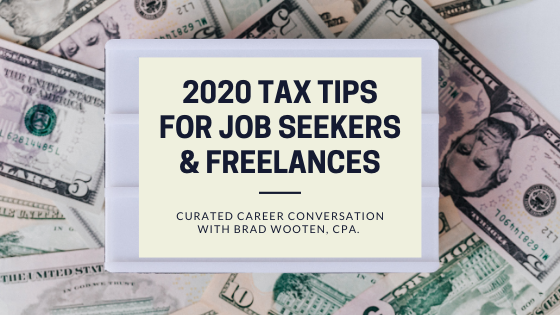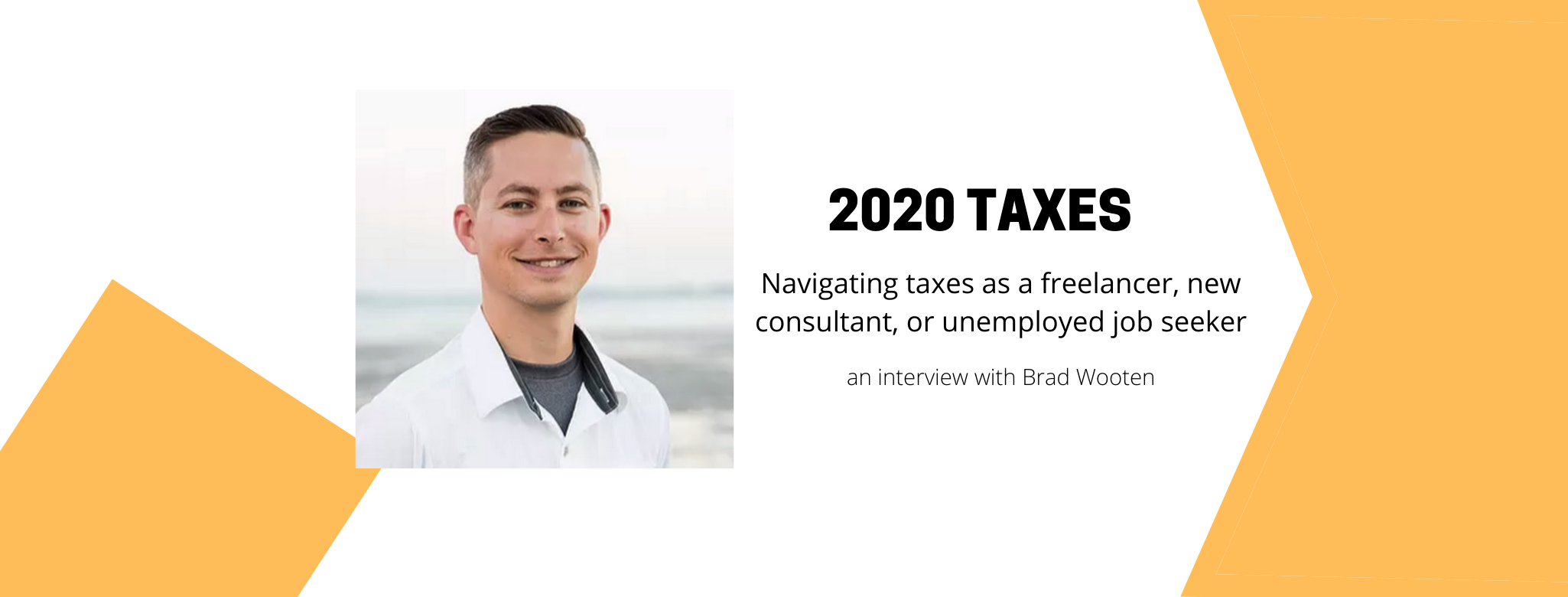2020 Tax Tips for Job Seekers and Freelancers

Your tax situation might be very different this year than last. Especially if you:
- Worked from home part of the year (home office deductions, anyone? )
- Started a consulting business or did freelance work
- Accepted Coronavirus Aid, Relief, and Economic Security (CARES) Act support
I believe that knowledge is power— and the more you know, the more you can thoughtfully plan so that you aren’t surprised in April of 2021. That’s why I reached out to Brad Wooten, a respected CPA and small business accountant based in Orlando. Brad started his career in audit for a top 20 CPA firm in North Carolina before moving back to his hometown and becoming a named partner in local tax practice. In 2019, he started his firm, which focuses on bringing peace to clients’ finance and tax responsibilities. In addition to tax planning and preparation, he helps taxpayers resolve IRS tax debts and other tax problems. Brad currently lives in Orlando, FL, with his wife and three sons, but works with clients from across the U.S. by utilizing the latest in cloud technologies.
Sarah: According to the Bureau of Labor Statistics, 12.6 million people filed for unemployment in September. How does unemployment impact one’s tax situation?

Brad: There are different types of unemployment someone might qualify for, but for most people, the full amount of benefits received will be taxable income. Unfortunately, many individuals do not realize this and fail to plan accordingly. Those receiving benefits should elect to have federal (and state, if applicable) taxes withheld from their unemployment checks. I know it hurts now since the amount paid will be lower, but it will help avoid a difficult situation at tax time.
Coronavirus Relief Benefit is Taxable Income
Sarah: I was surprised to learn that the “Coronavirus Relief Benefit” (or the $600/week unemployment benefit) is taxable income. For people who did not put the money in a savings account and used all of the benefits for food and to keep the lights on this year, is there any relief?
Brad: I think it was a very helpful benefit that the CARES Act provided by increasing unemployment by $600 per week to those who qualified. As I mentioned before and in your question, many people did not choose to have taxes withheld from their benefits. It is quite possible that these individuals will owe a balance with their tax returns when they file in 2021. At this time, there has not been any mention of provisions that would provide relief such as making these payments non-taxable income. This will be considered taxable income just like the standard unemployment received. Individuals can go to a CPA for tax projections or the IRS has an excellent free tool they should use to project their taxes: https://www.irs.gov/individuals/tax-withholding-estimator
Sarah: The average executive job search can take anywhere from six months to a year. Many career experts advise unemployed job seekers to consider freelancing or creating a consulting practice to bridge an unemployment gap. What are the tax benefits to doing this?
Brad: Owning your own business, or freelancing, can open the door to many tax benefits. Taxpayers may qualify to deduct a portion of their household expenses if they have a qualifying home office. This would allow for the deduction of some portion of your homeowner’s insurance, rent, and utilities, which are not typically deductible expenses. It could also allow those who do not itemize to deduct a portion of their mortgage interest and property taxes. If they drive frequently for this work, the standard mileage deduction can be a significant tax saver. Taxpayers need to be aware of the requirement to keep a written log for any mileage to be an allowable tax deduction. Many taxpayers think they can estimate this, but the IRS does not allow estimates for business mileage. If they find a job quickly, or the business does not quite take off as expected, they may end up being limited by the hobby loss rules. I have a blog article and YouTube video to summarize these considerations. The business could even grow into their full-time job. Depending on how well they do and their circumstances, they could qualify for the self-employed health insurance deduction as well as the ability to set up a retirement plan for additional tax benefits. At some point, they may desire to file articles to become an LLC and perhaps even benefit from electing to be treated as an S Corporation for tax purposes. This decision really is case by case and they should consult a CPA, but S Corporation status could save thousands in taxes for a self-employed person.
The warning I have here is that many taxpayers who are used to being an employee, fail to appropriately plan for taxes when they become a self-employed worker. They no longer have the benefit of federal (and state, if applicable) tax withholding. Not only do they need to set aside money to pay income taxes, but self-employment taxes (social security and Medicare) as well. Before, half of social security and Medicare taxes were withheld from their paycheck and their employer paid the other half. Now they owe the full 15.3% and that is on top of income taxes. A general rule of thumb is to set aside one-third of your business’s gross income (before expenses) for taxes. Taxpayers also need to keep accurate and detailed records of income received and business expenses (including receipts) incurred. One last caution, many taxpayers think they can pay the taxes owed at tax time. However, often the requirement to pay quarterly estimated tax payments kicks in and the taxpayer could owe some penalties and interest if they wait until they file their return to pay the taxes.
2020 Tax Deductions for Job Seekers
Sarah: Pre-2018, tax payers in the US could deduct job search expenses (like the cost of a resume or a new suit). Are there any tax deductions job seekers need to know about?
Unfortunately, the Tax Cuts and Jobs Act (“TCJA”), passed at the end of 2017, ended any tax benefits for job seekers. All these expenses that were once deductible are now personal expenses with no tax benefits. To be honest though, very few job seekers before the TCJA were able to deduct these expenses since they were miscellaneous itemized deductions subject to a threshold based on your adjusted gross income. So, I do not think taxpayers should stress too much about this perceived lost benefit. More importantly, the TCJA made moving expenses a personal, nondeductible expense even for what were previously qualified moves. Taxpayers whose new employer covers the cost of a move should pay particular attention to this because those expenses that are paid for by or reimbursed by their new employer are now taxable earnings, whereas before they were tax free.
Sarah: If you could go back in time, what would you tell yourself five/ten years ago?
Brad: Parenting is harder than you think it is… give yourself more grace. As far as my career goes, I don’t think I would have wanted to know anything ahead of time because had I known some of the challenges that were ahead of me, it may have affected some of the decisions I’ve made and I would not want any of it to be different than it has been. Each transition, challenge, and experience has prepared me for where I am right now.
Brad’s Best Career Advice
Sarah: Last question (I ask everyone this question). What is the best career advice you’ve ever been given? Did you take it?
Brad: This is a hard one. There has been so much good advice… I will go with something I tell myself frequently and it relates to the previous question – Do not second guess your decisions. You made them with the information that was available at the time and you cannot go back and do it differently. With the ease of travel and the level of technology today, there are so many options available to everyone. You cannot do everything and the decision you made to say “no” to one option is what allowed you to say “yes” to what you are doing right now. There is no benefit from second guessing those choices years later.
Want to learn more about Brad Wooten? Visit the his website, suscribe to his YouTube channel, or follow him on facebook and LinkedIn for more content.
